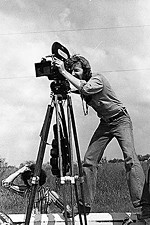Page Two
The City Council should negotiate the Stratus deal from a position of strength; we remember the tragic life and brilliant filmmaking of indie pioneer Eagle Pennell.
By Louis Black, Fri., July 26, 2002

The truth is that Eagle Pennell was one of the most important pioneers of independent and regional filmmaking; his influence on contemporary American cinema shouldn't be underestimated. Somewhere along the way, his extraordinary work has been drowned; not readily available, the films of Eagle Pennell have been swamped by the stories of Eagle. Really, just two films of the five he directed -- two wonderful, warm, influential films -- left a wake that is still rolling onto shore.
The Whole Shootin' Match, starring Lou Perryman and Sonny Carl Davis, is the story of two losers, two dreamers who never give up -- in the death of one scheme is the birth of another. It is a film that marries tremendous affection for its characters (including Doris Hargrave, another Austin acting legend) with the leisurely pacing of a born storyteller more interested in nuance than cinematic pyrotechnics. The film was co-written and co-produced by Austinite Lin Sutherland.
Released in 1978, it was a hit at the USA Film Festival (predecessor to Sundance). Released in 1978, it insisted that, rather than dream about Hollywood, filmmakers should go out and make their own films; it was a declaration that regional cinematic storytelling was as evocative as anything coming out of Hollywood. Released in 1978, two years before John Sayles' Return of the Secaucus Seven, it was a call to action. Moviemaking belongs to no industry; it belongs to the people who make movies.
In 1983, Pennell's masterpiece, Last Night at the Alamo (written and produced by Texas Chainsaw Massacre scribe Kim Henkel), was released. Shot documentary style (and also starring Perryman and Davis), this film tells the story of a bar's last night. The death of just another honky-tonk in Pennell's hands becomes a eulogy for a Texas quickly passing, a cinematic tone poem celebration of loss and life.
Sadly, though he was wooed by Hollywood and directed three more features, Alamo was Eagle Pennell's peak. I've never seen City Life (1990), and I like things about both Ice House (1989) and Doc's Full Service (1994), but they weren't the brazen steps forward we all expected. About one of them, I wrote a review that said every Pennell film since Alamo looked like a first film effort by a very promising new director, which wasn't exactly a compliment. Eagle called me up, crying, to tell me the review was on target.
I don't remember even when I first met Eagle. It seems like I've known him for a very long time. As with everyone who knew him, I have great stories to tell. But I don't want to lose the point. Today, with new technology, there are more garage feature filmmakers than garage bands. There was a time when Hollywood almost completely dominated narrative filmmaking, with very few independent films squeezing into the marketplace every decade. Every decade. Now, that many probably escape every week.
The influence of Pennell's films is of historic importance. The charm of these films -- celebrating character, set firmly in a place, relishing their culture -- makes clear that, even if they had been made much later, they would still have the emotional resonance. There were a couple of decades where drink mattered more than film to Pennell. This is a shame. As film critic Joe Leydon said to me, there is nothing more heartbreaking than unfulfilled promise. Even toward the end, a broken man painfully conscious of his debilitating personal weaknesses, Eagle was always intelligent and often charming. Lou Perryman, a key player in the Pennell stock company, and I reminisced about how all of Eagle's friends at one time or another had thrown him out. As a tribute to Eagle, devastated by alcoholism, they also welcomed him back at even the hint of the old Eagle. Every attempt to go sober was greeted with widespread support. Every attempt failed. The triumph here isn't biography; it is creative inspiration. In a desert, Eagle led several generations of filmmakers to the oasis. Finally, there are the films. Only five features, but two of them are truly great. The influence of Pennell's vision is historic, but the real importance is the many pleasures of The Whole Shootin' Match and Last Night at the Alamo.
Read some of the letters this week. There is still the notion being floated that the City Council, if it only had the courage, could say no to development. That is a sweet heroes-and-villains scenario, but it isn't true. If the council turns the Stratus deal down, the deal is dead, but not the development. The council can't say no to development. This is an option that doesn't exist, and rhetoric should leave it behind. I would like to see the council end hunger in Austin and bring world peace as well, but they also can't do that. It is a stupid fiction to argue that, if only the council were courageous, they could stop development over the Aquifer. The council can try to make deals, restrict and control development, but they don't have the power to stop it. If we grow up and accept that this is not Horatio's failure at the bridge but a complex political and legal web, that would be a huge step forward. Why is it we've elected so many green candidates over the years, and they've all seemed to turn? Maybe because when they faced the difficulty of the situation, they realized its complexity rather than they sold their souls to the developer devil.
This said, I'm not sure why it seems that the council is always negotiating from a position of weakness rather than strength. Why it seems that they are always scrambling to catch the ball rather than taking control of the game and laying out the rules. I'm not endorsing the deal with Stratus, but I am arguing there is a need to compromise, as distasteful as it might be. Crucial to the argument, though, is the responsibility of the council to lead rather than follow, to demand rather than acquiesce.
The truth is that more development will impact negatively on the Edwards Aquifer and Barton Springs. But science isn't politics. Science is real, but it is not the governing reality. Over the last decade, SOS has been very busy saying no and rallying the troops. I think this is a failure of imagination. If SOS were aggressively pursuing compromises that were workable for the developers and less harmful to the environment, they would be more of a force in the community. It is great to attack developers, dismiss elected politicians, decry the press, and rally the troops. The consequences of these actions become more and more self-serving and less and less effective. Why not a positive agenda, an agenda that offers workable and not idealistic compromise, an agenda that offers an achievable vision for the future?
Rather than roads or developers as the engine of growth, I think it's people. If SOS had a real vision, perhaps they would embrace and support roads that directed growth towards the more receptive areas and away from the more delicately balanced. Instead, they're busy saying no.
Last week I used the word "fuck" in my lead, which seemed to upset people, and I apologize. The points I was trying to make were too important to be restricted by language.
Finally, and I would think this would go without saying, the views in this column are mine. It should be clear that, on issues like the Stratus deal, there are significant disagreements between the other political writers, Publisher Nick Barbaro, the rest of the staff, and myself. I cherish those disagreements. ![]()










